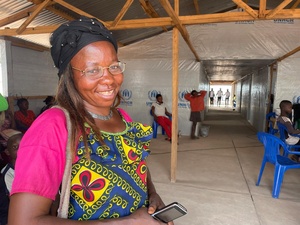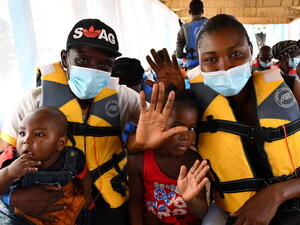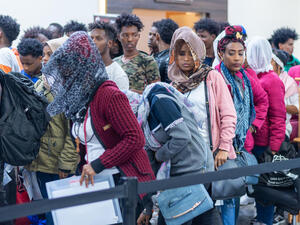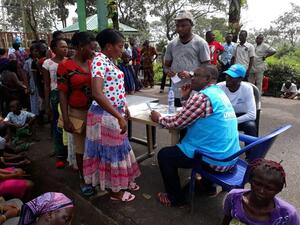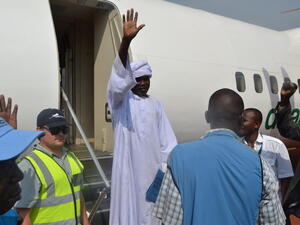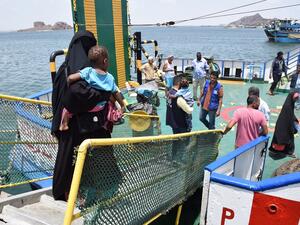UNHCR launches last phase of Somali repatriation from Djibouti
UNHCR launches last phase of Somali repatriation from Djibouti

A convoy of UNHCR vehicles and trucks carrying the 210 refugees reaches Djibouti's border with Somaliland.
LOYADO, Djibouti, November 20 (UNHCR) - The UN refugee agency on Tuesday began the final phase of its voluntary repatriation programme to help some 1,800 refugees return home to Somaliland from neighbouring Djibouti by the end of the year.
A convoy of 13 UNHCR-hired trucks carrying 210 Somaliland refugees set off early Tuesday from Djibouti's Ali Addeh camp and headed the 130 kilometres to the Loyado crossing point on the border with Somaliland, a de facto republic within the internationally recognized borders of Somalia.
"This is the final leg of what has been a long exile for many of the Somaliland refugees in Djibouti and we are happy that we are able to help refugees close this chapter of their lives in exile," Ann Encontre, UNHCR's representative in Djibouti, said at Loyado. She added that the repatriation operation, which began in July 2002, would be wrapped up next month.
The 1,800 refugees are one of the last groups of Somaliland refugees living in Djibouti. Many of the returnees fled to Djibouti more than 16 years ago after the collapse of the Siad Barre regime in 1991 and ensuing civil war in Somalia.
The return programme from Djibouti to Somaliland was suspended in March last year to allow for the electronic registration of all refugees in Djibouti. When the suspension took place, the UNHCR operation had helped some 19,400 Somali refugees return home.
Encontre said that once UNHCR officials had completed immigration formalities at the border, the convoy would head to a transit centre in Zeila town, located some 27 kms from the border in Somaliland's Awdal region. "When we arrived at the border, some of them got off the trucks and knelt down to say their prayers," the UNHCR official noted.
Returnees will receive a return package before continuing their journey Wednesday to their homes. As part of the return package, each returnee will be given the first of three instalments of a nine-month food package provided by the UN World Food Programme. The food package is designed to support returnees during the initial months of their re-integration.
UNHCR will provide some household goods to families, including kitchen sets, blankets, sleeping mats, jerry cans and plastic sheeting for shelters. In addition, returnees will receive some cash to help them pay for transportation from the various drop-off points, mainly in towns, to their home villages.
The majority of the refugees in Djibouti will return to the Awdal Region, where UNHCR and other partners have set up a wide variety of reintegration projects ranging from water, education, income generation, road infrastructure, health and security. These projects have already supported the integration of thousands of returnees from Djibouti and Ethiopia.
"We will work with the authorities to find alternative solutions to refugees from Somaliland who opt to remain in Djibouti," Encontre said of an estimated 1,000 refugees who have not yet registered for return to Somaliland and are likely to remain in Djibouti when the repatriation operation ends.
Since July 2002, the UN refugee agency has been promoting repatriation to Somaliland. UNHCR-sponsored "go-and-see" visits allowed refugees to assess for themselves conditions back home, and spread the word around the Djibouti camps.
Between February 1997 and March 2006, an estimated 300,000 Somaliland refugees have returned home from Ethiopia and Djibouti using their own means as well as through UNHCR's assisted voluntary repatriation.
Djibouti currently hosts nearly 7,000 refugees, mainly living in the Ali Addeh camp. Some 2,800 of these refugees are from Somaliland while more than 3,500 others are from south and central Somalia. There are also small numbers of refugees from Eritrea and Ethiopia.
Encontre said her office continues to report a small but steady influx of Somali refugees fleeing the conflict in south and central Somalia. In the past two months, some 250 refugees have sought asylum in this Horn of Africa country.


